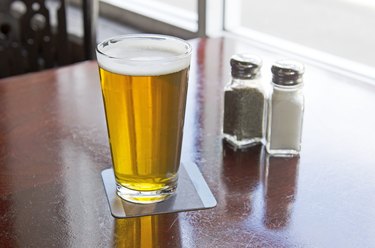
Cholecystitis is a term that refers to inflammation of the gallbladder, a condition that can be aggravated by certain foods. These include refined carbohydrates, alcohol, high-fat dairy products, fatty meats and foods that are fried or packed in oil.
Gallbladder Function
Video of the Day
Your gallbladder stores and concentrates bile, which is produced by your liver. When you eat a fatty meal, your gallbladder contracts and releases stored bile into the small intestine to digest the fat. Sometimes gallstones can get stuck and block a bile duct in the gallbladder, resulting in symptoms of cholecystitis. Unless gallstones block a bile duct, they may not cause any symptoms, according to the National Institutes of Health.
Video of the Day
Symptoms
Cholecystitis can cause symptoms such as pain and discomfort after meals, especially if you've eaten fatty foods. The pain is typically located in your upper right abdomen and may be accompanied by nausea and vomiting. Gallstones usually consist of cholesterol deposits and can vary widely in size. Blockages are typically caused by larger stones. If a stone remains stuck, it can cause a medical emergency that requires the removal of your gallbladder.
Dietary Suggestions
You should avoid excessive consumption of white flour, sugar and highly processed foods. You may also be intolerant of spicy foods. While you need some fiber in your diet, too much of it may actually exacerbate symptoms of cholecystitis if they cause you to have gas. You may be able to tolerate only small amounts of foods such as beans, cabbage, cauliflower, broccoli and whole grain products, all of which are high in fiber, according to registered dietitian Joanne Larsen.
Additional Information
Being overweight or gaining weight after losing it rapidly are among the risk factors for gallstone formation. While you should avoid eating excessive calories and fats, you should include 2 to 3 tbsp. of healthy fats like olive oil to keep the bile in your gallbladder flowing. If the gallbladder does not contract often enough to empty out the bile, gallstones may form, according to NetWellness.org.